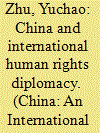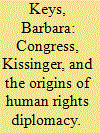| Srl | Item |
| 1 |
ID:
109478


|
|
|
|
|
| Publication |
2011.
|
| Summary/Abstract |
China has developed a multi-tier strategy in its human rights diplomacy. It has three aspects: in the multilateral international human rights arena, China's approach is dominated by the sovereignty principle and organising like-minded countries into a coalition; in bilateral diplomatic channels, China follows a combined policy of dialogue, negotiation, bargaining and supplementary economic incentives; and on certain international human rights issues such as in the case of Darfur, China mainly applies ad hoc and flexible policies. The core of China's approach is to protect its sovereignty as it continues to insist that human rights are a domestic matter. However, it is becoming increasingly difficult to maintain this rigid position. China must adjust its practice to conform to the international norms.
|
|
|
|
|
|
|
|
|
|
|
|
|
|
|
|
| 2 |
ID:
099987


|
|
|
|
|
| Publication |
2010.
|
| Summary/Abstract |
The Congressional "human rights insurgency" of 1973-1977 centered on the holding of public hearings to shame countries engaging in human rights abuses and on legislation cutting off aid and trade to violators. Drawing on recently declassified documents, this article shows that the State Department's thoroughly intransigent response to Congressional human rights legislation, particularly Section 502B, was driven by Kissinger alone, against the advice of his closest advisers. Many State Department officials, usually from a mixture of pragmatism and conviction, argued for cooperation with Congress or for taking the initiative on human rights issues. Kissinger's adamant refusal to cooperate left Congress to implement a reactive, punitive, and unilateral approach that would set the human rights agenda long after the Ford administration left office.
|
|
|
|
|
|
|
|
|
|
|
|
|
|
|
|
| 3 |
ID:
191679


|
|
|
|
|
| Summary/Abstract |
Following his appointment as Foreign Secretary in February 1977, David Owen framed human rights promotion as a guiding principle of British foreign policy. Sensitive to Iran’s significance as a pro-Western power in the Middle East and appreciative of the opportunities that the Shah’s custom provided for British business, Owen would continue to champion human rights promotion as a central pillar of Britain’s international agenda while simultaneously providing support to the Shah’s dictatorship. This article scrutinises Owen’s attempts to rationalise this fundamental contradiction by constructing a ‘morality of compromise’ which drew inspiration, inter alia, from the value pluralism espoused by the philosopher Isaiah Berlin. In so doing, analysis not only complements and builds upon existing coverage of Anglo-Iranian relations and the marginalisation of human rights concerns therein; it also highlights the importance of moral psychology and its role in shaping ethical foreign policymaking at an individual level.
|
|
|
|
|
|
|
|
|
|
|
|
|
|
|
|